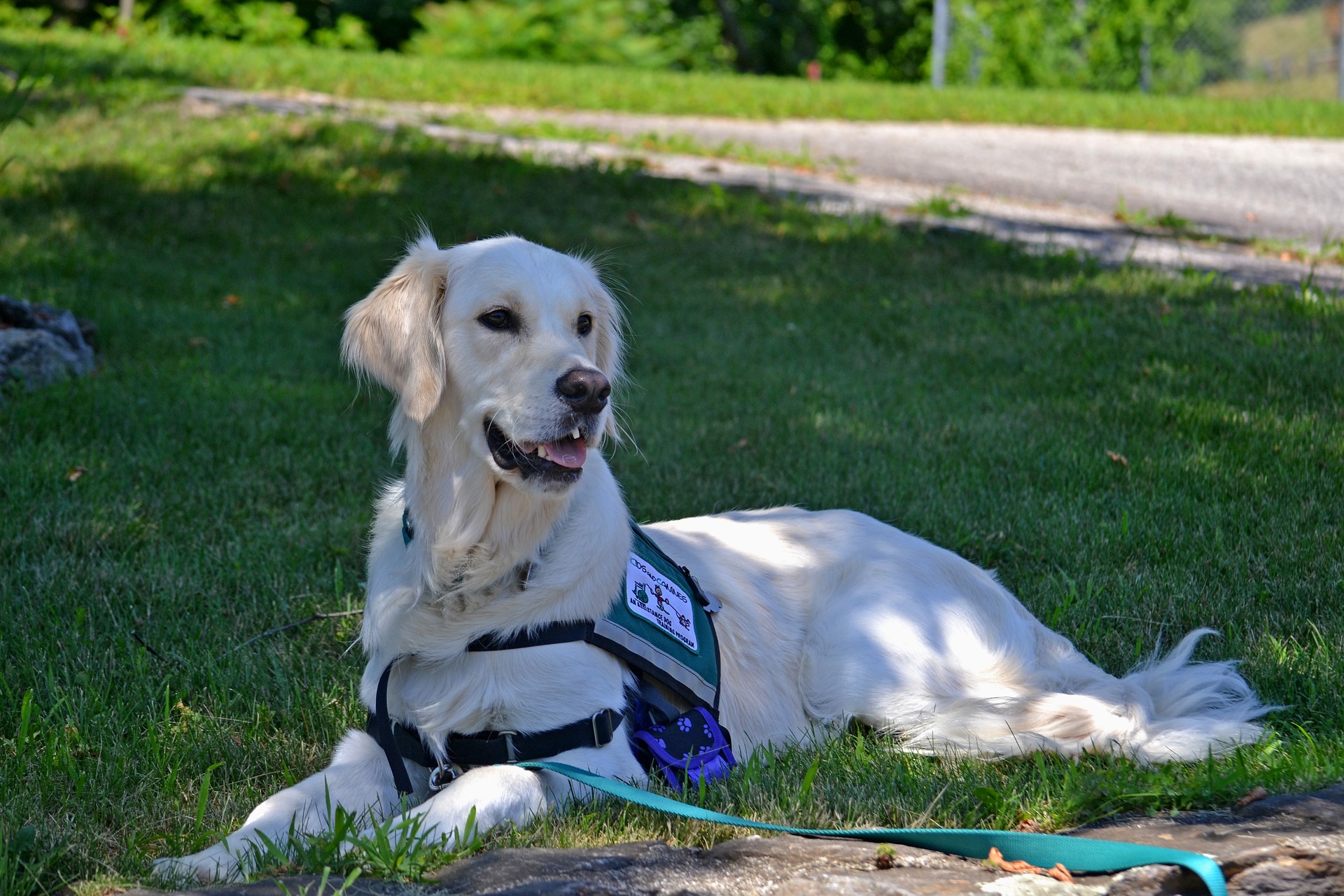While regular pets may be not be allowed in grocery stores for reasons of hygiene, what about working animal, like police dogs and assistance animals? As you might guess, on-duty police dogs are permitted to enter grocery stores—just imagine if a K-9 team was rushing to catch a criminal and the officer had to stop and tie their dog up outside first!
The other notable exception is service animals. The most well-known kind of service animal is a guide dog (or seeing-eye dog), but other types of service animal include hearing dogs, seizure response dogs, diabetic alert dogs, and mobility assistance dogs. All these qualify as service animals, and they are all permitted access to public places under the Americans with Disabilities Act (ADA).
Business owners are allowed to ask only two questions of people with service dogs:
1) if the animal is a service animal, and
2) what task it performs, if that’s not immediately obvious.
Remember, not all service dogs wear special harnesses, so if you and your pet get turned away from a grocery store and you see someone else with an animal inside, try not to kick up a fuss, as it may well be a service animal.
For the hygiene-conscious, rest assured that both police dogs and service animals are highly trained, and are very unlikely to start putting their paws on the food or licking anything. These dogs have an important job to do, and they know it.
Service Animals, Emotional Support Animals… Which Are Allowed? And What’s the Difference?
Emotional support animals are in the news more and more recently, yet a lot of people remain confused about what they are exactly, and whether they count as service animals. The short answer is that while emotional support animals (also known as ESAs) and service animals both count as assistance animals, they are not the same, and are not treated the same in law.
Most importantly, the ADA does not cover ESAs, and as such, they are not permitted in grocery stores.
The big difference between the two comes down to training. While service animals go through years of specialist training in order to perform specific tasks for people with disabilities, ESAs do not require any sort of training. Instead of helping with a specific task, ESAs help their owners by providing love, affection, comfort, and support, helping them to overcome the symptoms of emotional or mental conditions like anxiety, PTSD, and depression.
While any pet can become an emotional support animal, you can’t just start calling your pet an ESA. An ESA must be prescribed by a licensed mental health professional who is treating you for a mental or emotional condition. This can be in person, or through a legitimate emotional support animal registration. They will do this by writing an ESA letter, which states that you have been diagnosed with a mental condition, and your ESA is a necessary part of your treatment.
Although ESAs are not covered by the ADA, they are covered by two other laws, which permit them to travel with their owners free of charge on commercial airlines, and to live with their owners in rented accommodation, even where other pets are prohibited.
What About Other Stores?
The FDA guidelines also state that animals should not be permitted indoors at restaurants or other places that serve food (again, with the exception of service animals). Many cafes, bars, and restaurants get around this rule though by allowing customers to sit outdoors with their pets. Look for places with terraces, gardens, yards, or balconies, but always remember to ask before you sit down, and to keep al pets under control.
However, the good news for pet parents is that many other non-food stores are allowed to permit pets, though naturally the decision to do so rests with the owner or manager. While once upon a time it was only pet supply stores that allowed pets to come in, trends have changed and more and more stores allow well-behaved pets to come and shop with their parents.
Pet-Friendly Chains
Below is a by-no-means-exhaustive list of chain stores in America that are likely to allow pets. Be warned though, that not all branches of these chain stores are guaranteed to permit pets.
If your pet cannot wait outside or in the car, make sure to ring in advance and check whether pets are allowed. And if you’re told that your pet cannot come in, resist the urge to cause a scene. Far from making them more inclined to allow your pet to come in, the store is going to be even less likely to permit pets in the future.
Petco
Home Depot
Lowes
Tractor Supply Co.
Nordstrom
The Apple Store
Bass Pro Shops
Pottery Barn
LUSH cosmetics
Macy’s
TJ Maxx / Marshalls
Barnes and Noble
Restoration Hardware
Gap
Bloomingdale’s
Urban Outfitters
Anthropologie
Free People
Foot Locker
Nordstrom
Old Navy
Saks Fifth Avenue


